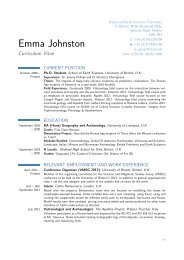What is Scientific Progress?
What is Scientific Progress?
What is Scientific Progress?
You also want an ePaper? Increase the reach of your titles
YUMPU automatically turns print PDFs into web optimized ePapers that Google loves.
properties such as truth or knowledge. We do not regard a pseudo-problem resolved by further false<br />
beliefs as progress, however much it may appear to be progressive from the internal perspective.<br />
Laudan thinks that it <strong>is</strong> an advantage of h<strong>is</strong> account that progress can be assessed internally. But<br />
making progress that easy to achieve <strong>is</strong> to make progress not worth having. The semantic account<br />
makes progress more difficult and more worthwhile, by relating it to the clear benefits of truth. On<br />
that view, for us to know that progress was made when scient<strong>is</strong>t S came to believe theory T will<br />
thus require us to know that T <strong>is</strong> true or that it <strong>is</strong> closer to the truth than its predecessors. S herself<br />
will know she has made progress if and only if she knows T to be true or approximately true. On the<br />
ep<strong>is</strong>temic account, progress <strong>is</strong> even harder to achieve. For S to have made progress, it <strong>is</strong> not enough<br />
that T be true, S must know that T <strong>is</strong> true. Correspondingly, for S to know that she has made<br />
progress, S must know that she knows that T <strong>is</strong> true. S may well be in such a position, but since one<br />
does not necessarily know that one knows, it will also be possible to be in the position of having<br />
made progress but not knowing that one has done so. Th<strong>is</strong> <strong>is</strong> plausibly the case when T <strong>is</strong> as the<br />
cutting edge of a field and when new methods and techniques are used in confirming T. Far from<br />
being internally accessible, like many of the best things in life, the most exciting contributions to<br />
progress are often recognizable as such only with the benefit of hindsight. 21<br />
References<br />
Bird, A. 2000 Thomas Kuhn Chesham: Acumen.<br />
Bragg, W. 1936 “The <strong>Progress</strong> of Physical Science” in Jeans, J. et al. 1936 <strong>Scientific</strong> <strong>Progress</strong><br />
London: George Allen and Unwin.<br />
Collingwood, R. 1956 The Idea of H<strong>is</strong>tory New York: Oxford University Press.<br />
Hoyningen-Huene, P. 1993 Reconstructing <strong>Scientific</strong> Revolutions Chicago: University of Chicago<br />
37






